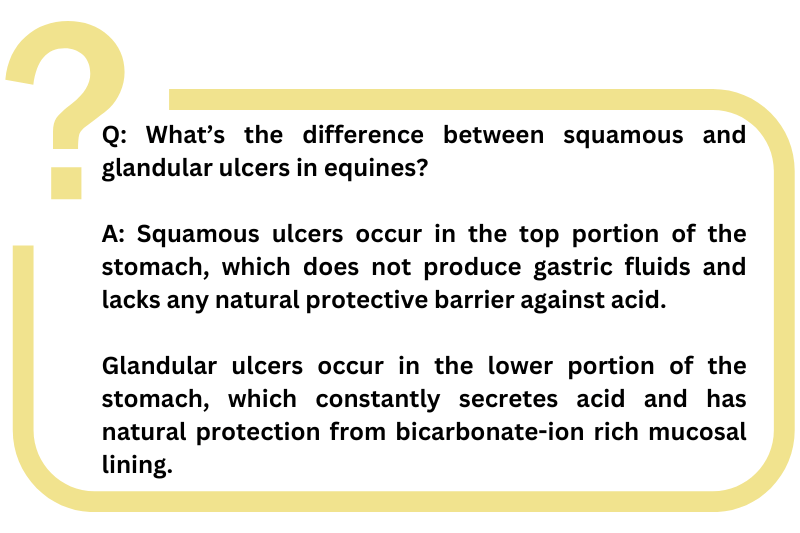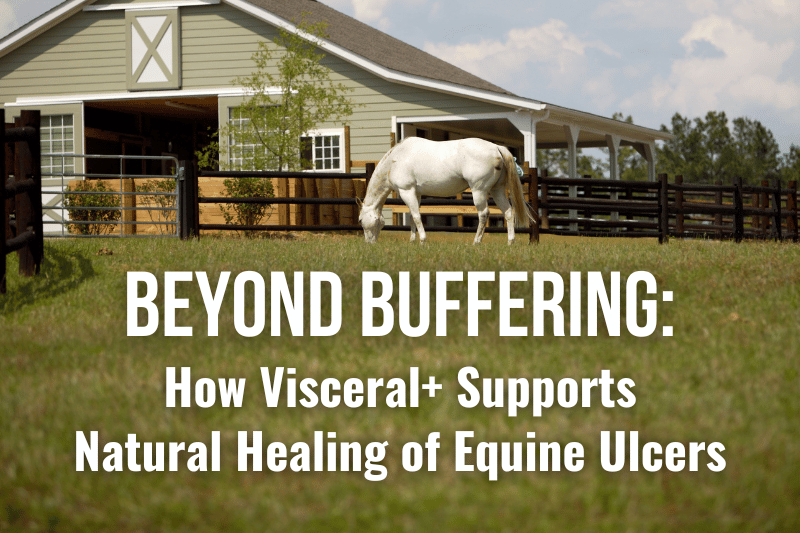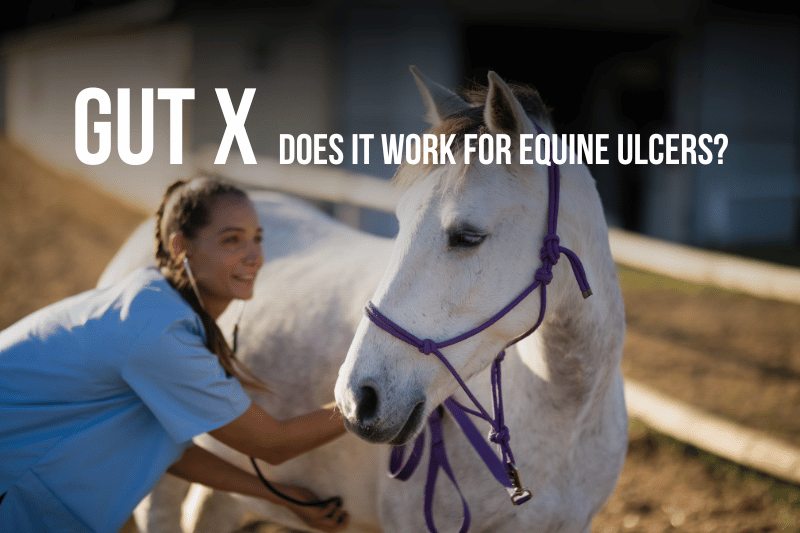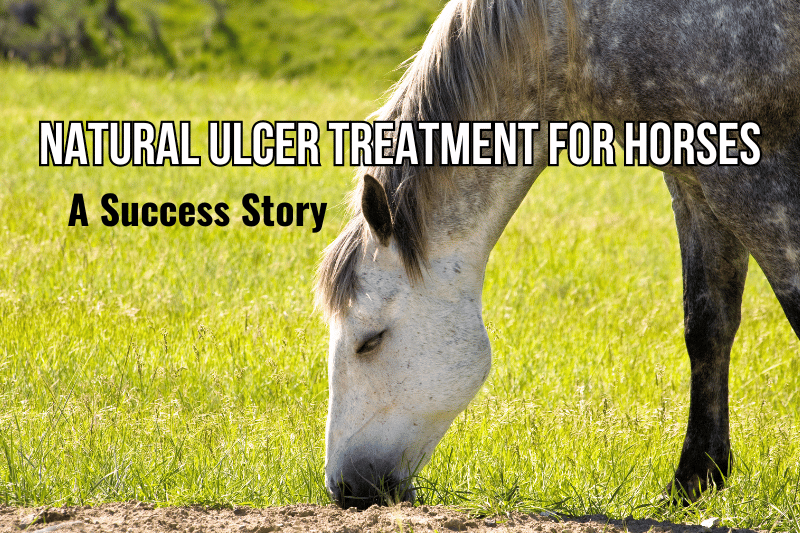Equine gastric ulcers. Equestrians live in fear of them, and with good reason. Amid myriad marketing claims, we are left wondering: What is the best ulcer supplement for horses? Is acid-buffering the right approach? What does the research say, and why isn’t there more of it?
Last year, as I battled ulcer symptoms in both a rehab horse and my endurance prospect, I came across an intriguing product by Mad Barn. Over a couple months of use, Visceral+ appeared to support natural healing for both horses. I wanted to learn more.
Enter Linaya, an equine nutritionist with Mad Barn, who sat down with me (virtually) for a conversation about how Visceral+ works and what it brings to our anti-ulcer arsenal.
Gastric Ulcer Risk in Endurance Horses
Linaya laid the groundwork for our conversation by confirming that several risk factors for gastric ulcers are built into the lifestyles of our endurance horses.
Not only is travel stressful, but riding in a trailer requires a horse to engage his core for balance. This pushes stomach acid up from the glandular portion of the stomach into the unprotected squamous portion. Additionally, long periods of exercise without forage in the stomach are baked into our sport.
The prevalence of squamous ulcers in endurance horses during the competition season is 66-93%, and glandular ulcers occur at 27-33% during the season. (Off-season prevalence is 48% and 16%, respectively.) Though gastric ulcers are not uncommon even in pleasure mounts, only thoroughbred racehorses in training see higher rates than endurance horses (1, 2).

To make matters worse, the only FDA-approved treatment for Equine Gastric Ulcer Syndrome (EGUS) is the omeprazole paste GastroGard. Thirty days of treatment (which may or may not be sufficient) costs about $1,200. Discouragingly, recurrence rates can be as high as 90%.
The potential for acid rebound following cessation of omeprazole (3) is of particular concern to endurance riders, who frequently administer UlcerGard for several days surrounding distance riding events.
Visceral+ is a blend of nutraceuticals and pre- and probiotic ingredients demonstrated to support the horse’s natural healing mechanisms and prevent gastric ulcer recurrence. Let’s dive into my interview with Linaya to learn more.
The Sweaty Equestrian: How is Visceral+ different from a buffering product like Outlast?
Mad Barn: Buffering products have their place, and there are plenty of good ones on the market. They can be very helpful to cut down on stomach acidity in high-risk horses during high-stress times, like trailering and competition.
However, people don’t always realize how temporary they are. Some believe feeding a buffering product once per day will protect their horse, and that’s not really the case. Buffers are only effective while they’re in the stomach – at best a couple hours.
Also, the horse’s stomach is naturally acidic for a reason. It’s supposed to be that way to help kickstart the digestion of proteins, activate enzymes, and kill harmful bacteria that the horse ingests.
Mad Barn wanted to create something more comprehensive than a buffer – an ulcer supplement that works with a horse’s natural gut physiology instead of against it. We know that ulcers can heal spontaneously, without medical treatment (4). Visceral+ is designed to support a horse’s natural healing mechanisms and immune health.
The Sweaty Equestrian: Do we need to worry about buffering supplements compromising immune defenses in a ride camp environment, where space and water troughs are shared with other horses?
Mad Barn: Temporary buffering, such as during competition, is appropriate and there’s no need to overblow the immune defense concern in that context. However, we wouldn’t want to suppress the stomach’s natural acidity 24/7.
The Sweaty Equestrian: Can you explain the basics of what ingredients are in Visceral+, and why?
Mad Barn: We didn’t put anything novel in the product hoping that it might work. Instead, we went to the research literature to determine what would support the horse’s natural physiology and ability to heal.
Some of the most physiologically effective ingredients include:
- Lecithin, a phospholipid that helps make up the mucosal barrier against acid in the stomach, allowing tissue repair to occur (5, 6).
- Glutamine, which is an amino acid that serves as the main energy source for intestinal cells (7, 8).
- Mannan-oligosaccharides, which not only support mucus production, but also provide immune support by binding to areas where bacteria might otherwise adhere and promoting immune cell production in the hindgut (9).
Additional ingredients, all supported by research (mostly in horses, but with some exceptions), include saccharomyces cerevisiae yeast (10, 11), slippery elm (12), marshmallow root extract (13), meadowsweet (14, 15), and bioactive proteins (16, 17). You can read about the proposed mechanism of action and efficacy of each on this page and view the full list of ingredients here.
None of the ingredients in Visceral+ are on AERC’s banned substances list.
The Sweaty Equestrian: I notice that hyaluronic acid and beta-glucans are missing from that list. Did Mad Barn consider them as ingredients? If so, why did you decide against them?
Mad Barn: Mostly just the lack of significant research into those two ingredients.
Beta-glucans ferment in the hindgut and have immune modulating properties (18), but there isn’t any significant literature in terms of its efficacy for gastric health in horses.
Hyaluronic acid is something we’re keeping an eye on, but there is little research beyond the Slovis study to support its efficacy for ulcers in horses.
I dive deeper into hyaluronic acid, beta-glucans, and the Slovis study in this article about GutX for equine ulcers.
The Sweaty Equestrian: Can you talk more about how Visceral+ supports the hindgut?
Mad Barn: Gastric health is the main focus of Visceral+, but the hindgut has a strong link with immune health, which is regulated and influenced by the microbiome. In addition to the manna-oligosaccharides, Visceral+ contains full doses of pre- and probiotics that stabilize the beneficial bacteria in the hindgut.
The Sweaty Equestrian: Are there any health conditions or drug interactions that would make Visceral+ inappropriate for a particular horse?
Mad Barn: None of the ingredients in Visceral+ are problematic to combine with any drugs or medications. However, it is not approved for use in pregnant or lactating mares.
The Sweaty Equestrian: Let’s talk about research. We would all love to base our supplementing decisions on large, independent, controlled, double-blinded studies. Can you help us understand why these are rarely available?
Mad Barn: It mostly comes down to funding. Research is expensive, and it tends to be funded by a combination of government, university, and private money. Those entities are generally motivated by economics, which leads them to focus on “productive” animals like cattle instead of horses. Although equines do contribute to the economy, their “valuable” outputs are nowhere near those of agricultural livestock.
The Sweaty Equestrian: In a perfect world, a horse owner concerned about ulcers would scope, treat, and scope again – but most of us can’t afford to do that. What can we do, in light of those limitations, to make good decisions about ulcer prevention and treatment for our horses?
Mad Barn: Gastroscopy is definitely ideal because knowing where the ulcers are can help us pinpoint how to treat them. For example, squamous ulcers tend to respond well to management factors like forage access and avoiding large grain meals. Glandular ulcers are less influenced by starch and sugar in the diet and can be trickier to treat. However, scoping certainly has practical limitations.
Before purchasing supplements, horse owners should ask companies for their research. Find out if there are studies on the ingredients, if not the product itself. If consumers consistently ask for clinical trials on the products and their ingredients, and verify that products contain effective doses of those ingredients, more companies are going to need to have that information ready.
The Sweaty Equestrian: We’ve established that the ingredients in Visceral+ are backed by research. What about the product itself?
Mad Barn: Of course we always wish we had more studies, but there is one trial on Visceral+. We already knew the ingredients should work, so the goals of the study were to verify that the ingredients remained safe and effective when combined into a single product, and to look at its impact on ulcer recurrence rates.
In the study, conducted at an independent vet clinic, horses with confirmed ulcers were treated with GastroGard for 15-30 days and fed Visceral+ starting 1-2 weeks before cessation of the omeprazole. At the end of the 60-day trial period, gastroscopy confirmed that all of the horses showed complete healing or significant improvement.
A notable weakness of the study is that there was no control group. However, other research indicates that ulcer recurrence rates are normally 20-90%. The lack of recurrence in the study horses suggests that Visceral+ is effective in keeping horses ulcer-free.
The Sweaty Equestrian: I think one of the reasons we tend to be skeptical about supplements is that, even when research says the ingredients are effective, we don’t know if the product contains enough of them.
Mad Barn: We call this “label-dressing.”
Mad Barn isn’t the only one looking at the research. A lot of companies slap, say, glutamine in their products. Supplementary glutamine is effective, but glutamine is also one of the most abundant amino acids in the horse’s natural diet — so if you’re only adding 10-100 milligrams, that’s not a substantial amount at all.
We ensure that Visceral+ contains effective dosages of all its ingredients based on the research.
The Sweaty Equestrian: Is Visceral+ appropriate for use only during stressful periods, or does it need to be fed consistently to have a benefit? Should I feed extra during competition or as a loading dose?
Mad Barn: Because Visceral+ is designed to work with the horse’s natural healing and immune mechanisms, it’s best to have it consistently in the system.
We don’t have research indicating that Visceral+ is more effective at a higher dose. Also, a loading dose isn’t necessary. I’d be pretty happy to have it in a horse every day at the recommended amount.
The Sweaty Equestrian: If I can’t afford to feed Visceral+ to all my horses all the time, how do I decide which ones to prioritize?
Mad Barn: If feeding Visceral+ year-round is a strain on the wallet, you can go without it in the off season when your horse is at home instead of traveling, he’s working less, and he has plenty of forage. Then put him back on Visceral+ in the competition season.
A silver lining for endurance riders is that the majority of gastric ulcers experienced by endurance horses during the competition season are squamous rather than glandular. Squamous ulcers tend to be easier to treat and more responsive to supportive management factors.
Many thanks to Linaya for sharing her knowledge with the endurance riding community!
Do You Want to Try Visceral+?
My horses have responded well to Visceral+, and I am encouraged by what I learned from Linaya about Mad Barn’s commitment to using research-backed ingredients in physiologically relevant doses.
Do you want to give Visceral+ a try? Readers of The Sweaty Equestrian can get 5% off their first Mad Barn purchase using my code 5%OFF-FROM-TAMARA-B at checkout. (They’ll also give me a little credit toward my own horses’ supplements, which is a cool way to support this blog at no extra cost to you.)
You should also visit Mad Barn’s super cool (and free) Equine Nutrition Calculator to learn whether your horse’s diet is meeting his needs.
You might also like
This post includes affiliate links, and I may earn a small commission (at no extra cost to you) when you purchase through these links. I only recommend products and services I think are helpful and useful. Thanks for helping me offset the cost of maintaining this blog as a free resource!





I love all my madbarn stuff, if your credit doesnt cover your supplements you can also use my code 5%-OFF-FROM-SARAH-C
I find I get enough referrals that I can cover every other shipment of my supplements, the codes can only use once so I keep a list of the 5% off ones that I can go down each time I need to place an order 🙂
Hey, good call! Thanks!